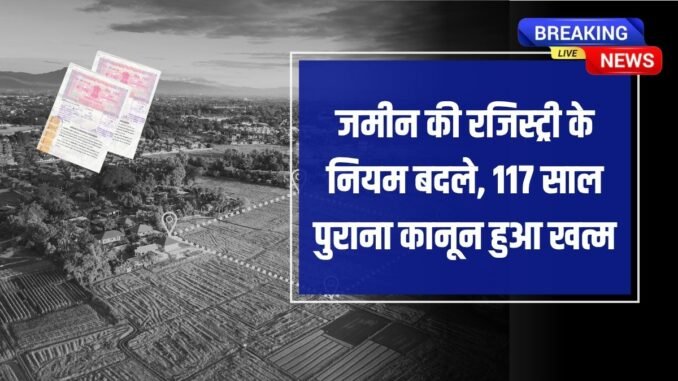
New Delhi, May 2025 — The Indian government is all set to introduce sweeping changes to the land registration process in 2025, ending the reign of a 117-year-old law that has long governed property transactions. The aim is to streamline land dealings, eliminate corruption, and usher in a new era of transparency through digitization.
This move is seen as a landmark reform under the broader “Digital India” vision, ensuring faster and more secure land transactions across the country.
Why Land Registration Matters
Land registration is a critical legal step that establishes ownership rights over a property. Without it, there is no formal proof of ownership, which could lead to disputes, fraud, or loss of property in the future. A registered deed serves as legal evidence and safeguards the owner’s interests.
The Legacy of Outdated Laws
India’s current land registration system is governed by the Registration Act of 1908. Despite being a foundational legal framework for decades, it has struggled to keep pace with modern requirements. The process has traditionally been paper-heavy, time-consuming, and vulnerable to corruption.
Key challenges have included:
- Lengthy manual paperwork
- Limited transparency
- Lack of data security
- High risk of fraud
Recognizing these shortcomings, the government has prepared a comprehensive draft law to replace the outdated system.
What’s Changing Under the 2025 Rules?
The upcoming Land Registration Rules 2025 propose several key reforms that will transform how land is bought, sold, and registered:
1. Mandatory Online Registration
All property registrations will now be conducted through digital platforms. Applicants can file documents, track progress, and receive digital certificates—all from the comfort of their homes.
2. Secure Digital Document Storage
Property-related documents will be stored in secure digital repositories (cloud-based systems), minimizing the risk of physical damage, tampering, or loss.
3. Expanded Document Coverage
Documents such as Agreement to Sell and Power of Attorney, which were previously optional for registration, will now be mandatory. This will curb legal loopholes and prevent fraudulent sales.
4. Aadhaar-Based Verification
Identity verification via Aadhaar will be compulsory for parties involved in property deals. This will enhance trust and reduce the risk of impersonation. Alternatives will be available for those unwilling or unable to use Aadhaar.
5. Uniform Rules Across States
Previously, land registration laws varied from state to state, leading to confusion and inefficiencies. Under the new law, a uniform system will be implemented nationwide, simplifying inter-state property transactions.
Benefits of the New System
The 2025 reforms promise numerous advantages for citizens and the real estate market:
- Transparency: Online portals will ensure end-to-end visibility in transactions.
- Corruption Reduction: Middlemen and unofficial agents will be sidelined.
- Faster Processing: Automated workflows will cut down processing time significantly.
- Secure Records: All documents will be digitally preserved and easily retrievable.
- Fraud Prevention: Aadhaar-linked identities will eliminate fake ownership claims.
What Property Buyers and Sellers Need to Do
If you’re planning to buy or sell land post-2025, here’s how to prepare for the new system:
- Link your Aadhaar with relevant legal documents.
- Update all land ownership papers to reflect correct information.
- Check land records online for transparency and verification.
- Convert physical documents into digital formats for submission.
- Use government portals for application and monitoring of the registration process.
Challenges Ahead
While the reform is progressive, implementing it nationwide will come with a few hurdles:
- Digital Literacy Gap: Citizens in rural and remote areas may struggle with online systems.
- Infrastructure Limitations: Reliable internet and tech access is still an issue in several regions.
- Administrative Readiness: Government departments will need time and training to adapt.
- Alternative ID Systems: Effective mechanisms must be developed for those without Aadhaar.
Government agencies are already working on solutions, including digital awareness campaigns, infrastructure upgrades, and staff training to ensure a smooth rollout.
The Road Ahead
The Land Registry Rules 2025 represent a major step toward modernizing India’s property market. By making land transactions transparent, faster, and more secure, the reforms aim to reduce legal disputes and build trust in the system.
In a country where land ownership is both a dream and an asset for millions, this initiative marks a crucial shift toward fair, efficient, and technology-driven governance.
If you own land or plan to invest in property, understanding these changes and preparing accordingly will be essential. This reform isn’t just a policy shift—it’s a promise of better land rights and protection for every citizen.

Leave a Reply